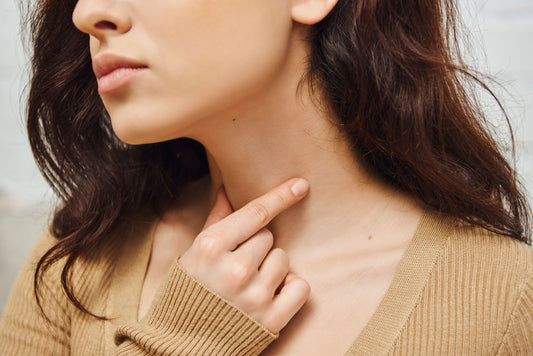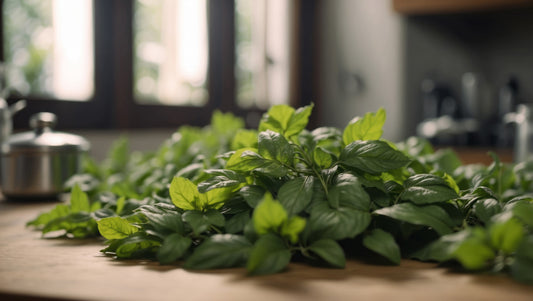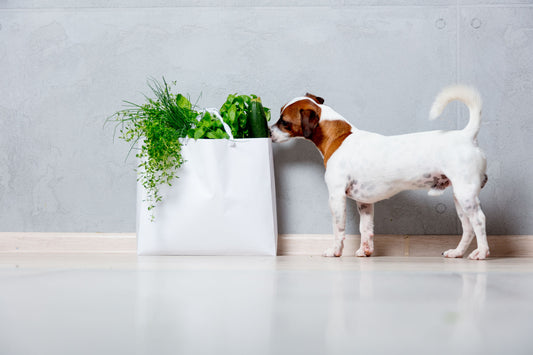Nurture Your Gut To Show Your Skin You Care
I’m betting most of us have had the dismaying experience of having our face break out after overindulging in fast food or sugary goodies. This puzzled health professionals for many decades, until the connection between the gut microbiome and skin health became clear.
You Are What You Eat Through the Gut-Skin Axis
What you eat has a significant impact on skin health because your skin ‘communicates’ with your gut through the type of nutrients absorbed and the gut’s effect on the immune system. Refined sugars and saturated fats have been shown to decrease beneficial bacteria in the gut, and increase inflammation in the body. Chronic skin problems like acne, rosacea, and psoriasis have been linked to imbalances in the gut environment (microbiome). Happily, when the microbiome is improved through better nutrition and stress reduction, the health of the skin also improves.
Your skin and gut have remarkably similar jobs: both connect with the world outside your body (as food, for the gut), both protect against toxins and unwelcome organisms, and both are essential to the function of your nervous and immune systems. The keratin in your skin operates much like the mucus layer in your intestines, being chock-full of bacteria with a microbiome of its own, which help defend against bad bugs and toxins that you’re exposed to. Damaged, broken skin and ‘leaky gut’ (compromised intestinal walls) are major opportunities for unwanted organisms to get into our bodies. See how crucial protecting the integrity of your gut and your skin is to your overall health?
Recent research also shows that our macro environment also affects our microbiome. For example, industrial agriculture’s practice of monocropping (stripping the land of its native plant diversity and growing one crop intensively, like corn or soybeans) and heavy use of chemical fertilizers and pesticides has rendered large areas of soil in the US nearly sterile. As a result, what lacks in our soil (beneficial organisms, nutrients) versus what is there, but shouldn’t be (pesticides, fertilizers, antibiotics from farm animal waste, heavy metals, toxic industrial compounds) all shows up in the health of our bodies. These are just a few reasons to choose (and champion!) food that’s grown organically and regeneratively (See more here): we aren’t just what we eat, but we are also the soil our food was grown in.
Thinking about all these connections, you may be wondering how to bring balance to your gut microbiome and skin health connection. It all comes down to everyday choices in what we eat, supplementing where necessary, and maintaining a healthy epidermis. Let’s explore some tips to improve both your personal health and even the health of our planet!
Tips for a Happy Gut Microbiome
Feed your good gut bacteria with fiber! Get it from:
- Whole veggies and fruits
- Whole grains (skip the wheat, if sensitive): brown rice, quinoa, rye, and heritage varieties like farro or einkorn. Sprout for improved digestibility and nutrition.
- Supplement with flax meal, acacia or oat fiber: here’s an easy, no-bake recipe that features both fiber and adaptogenic herbs.
Optimize your gut health with natural nourishment. We suggest:
- Weedy fresh herbs like dandelion, watercress, and nettles are naturally high in minerals, antioxidants, and vitamin K, giving your body easily absorbed, concentrated nutrition. Herbs like marshmallow, violet, and plantain can provide soothing, gut-healthy mucilage.
- Many spices (turmeric, ginger, cinnamon, cumin) are full of gut-boosting polyphenols and antioxidants, so go all in for meals and snacks. Opt for organic and fresh when possible to reap all their benefits.
- Supplement with a high quality probiotic with resistance against acid and bile to provide maximum benefit
- Get your ferments on! Sauerkraut, kimchi, kefir, kombucha, sourdough, tempeh and miso are some of the yummy ways you can get the happy-gut goodness of probiotics. (see a recipe for a cooling vinegar beverage here)
Support Your Skin For Whole-Body Benefits
- Choose simple and gentle cleansers to keep your skin’s acid mantle balanced.
- Nourish your skin microbiome by applying plain or herb-infused plant oils right after your shower. (Sesame, avocado, almond, and jojoba are great non-comedogenic picks)
- Eat healthy fats: olive oil, fatty fish, fermented ghee, nuts and seeds, avocados
Dirty, Healthy Fun
Gardening is one of the best ways to help your gut’s health, because interacting with soil organisms has been shown to improve the diversity of beneficial microbes in your body. If you do choose to ‘dig in’, be sure to choose organically grown plant starts and organic or heirloom seeds, and use compost and/or earthworms to help nourish the soil microbiome. Diversity in crops, non-GMO seeds, and resilient soil are crucial to our world's ability to feed all of us, into the future.
Getting your hands in the dirt isn’t the only way to benefit: hiking or walking out in nature on the regular is another way to interact with the beneficial microbes of where you live, and get a nice boost to your serotonin.
So, nurture your gut, and your skin will show you care: get plenty of fiber from plants, eat healthy fats, get herbs into your daily diet, and drink plenty of water and herbal tea (more gut-pleasing nutrients!). Supplement with probiotics or eat (and drink) fermented foods daily. Garden or get out into nature, for the boost to your gut, skin, and mental health. And remember, what you take in every day can have significant impact on your gut and skin microbiome.




